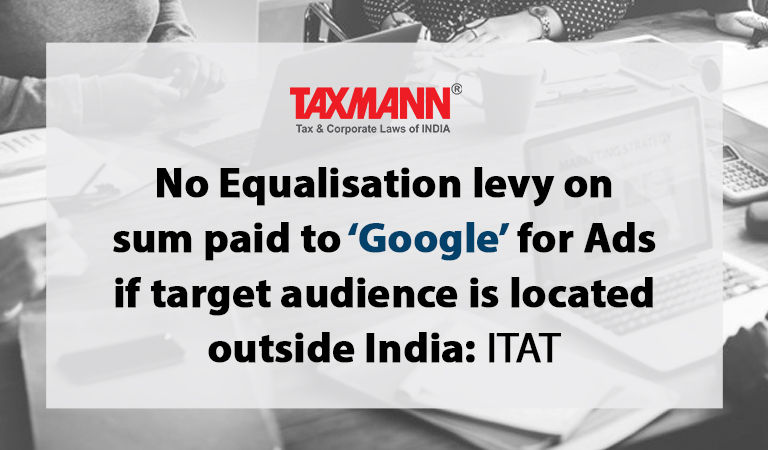No Equalisation levy on sum paid to ‘Google’ for Ads if target audience is located outside India: ITAT
- Blog|News|Income Tax|
- 2 Min Read
- By Taxmann
- |
- Last Updated on 24 December, 2024

Case Details: DCIT v. Prakash Chandra Mishra - [2022] 143 taxmann.com 121 (Jaipur - Trib.)
Judiciary and Counsel Details
-
- Dr S. Seethalakshmi, Judicial Member & Rathod Kamlesh Jayantbhai, Accountant Member
- Rajeev Sogani and Rohan Sogani, CA’s for the Appellant.
- P.R. Meena, CIT for the Respondent.
Facts of the Case
Assessee was an individual operating the business of providing support services for online ads, Digital Marketing and Web Designing. The assessee was an agent of Google Singapore.
Assessee carried out an online advertising campaign for his clients for availing of Google Singapore services. During the relevant year, assessee had made payment to Google Singapore towards online advertisement on behalf of his clients.
During scrutiny, the Assessing Officer (AO) made addition under section 40(a)(ib) for non-charging of Equalization levy (EL) as the conditions prescribed under section 165 of the Finance Act, 2016 are fulfilled.
On appeal, the CIT(A) reversed the order of the AO. The matter reached the Jaipur Tribunal.
ITAT Held
The Jaipur Tribunal has held the assessee was acting only as an agent of Google Singapore. On approaching the assessee, the assessee’s client gets login credentials, generated by the assessee on the website of Google. Through such credentials, the person on their own runs advertisements on Google.
Such a person decides where the advertisement is to be run in which geographical location, who would be the targeted audience, and for how much duration such advertisement is to run. All such aspects are decided by the person advertising and not by the assessee. The assessee was merely a conduit for getting the advertisement run on Google.
Thus, when the intention of the levy was related to the targeted audience and the party paying the online advertisement had no relation in India, EL is not attracted.
Disclaimer: The content/information published on the website is only for general information of the user and shall not be construed as legal advice. While the Taxmann has exercised reasonable efforts to ensure the veracity of information/content published, Taxmann shall be under no liability in any manner whatsoever for incorrect information, if any.

Taxmann Publications has a dedicated in-house Research & Editorial Team. This team consists of a team of Chartered Accountants, Company Secretaries, and Lawyers. This team works under the guidance and supervision of editor-in-chief Mr Rakesh Bhargava.
The Research and Editorial Team is responsible for developing reliable and accurate content for the readers. The team follows the six-sigma approach to achieve the benchmark of zero error in its publications and research platforms. The team ensures that the following publication guidelines are thoroughly followed while developing the content:
- The statutory material is obtained only from the authorized and reliable sources
- All the latest developments in the judicial and legislative fields are covered
- Prepare the analytical write-ups on current, controversial, and important issues to help the readers to understand the concept and its implications
- Every content published by Taxmann is complete, accurate and lucid
- All evidence-based statements are supported with proper reference to Section, Circular No., Notification No. or citations
- The golden rules of grammar, style and consistency are thoroughly followed
- Font and size that’s easy to read and remain consistent across all imprint and digital publications are applied



 CA | CS | CMA
CA | CS | CMA
